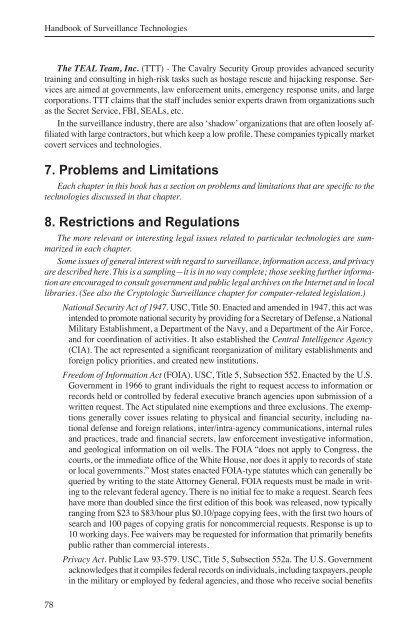Handbook of Surveillance Technologies (3rd Ed) - The Real Faces of ...
Handbook of Surveillance Technologies (3rd Ed) - The Real Faces of ...
Handbook of Surveillance Technologies (3rd Ed) - The Real Faces of ...
You also want an ePaper? Increase the reach of your titles
YUMPU automatically turns print PDFs into web optimized ePapers that Google loves.
<strong>Handbook</strong> <strong>of</strong> <strong>Surveillance</strong> <strong>Technologies</strong><br />
<strong>The</strong> TEAL Team, Inc. (TTT) - <strong>The</strong> Cavalry Security Group provides advanced security<br />
training and consulting in high-risk tasks such as hostage rescue and hijacking response. Services<br />
are aimed at governments, law enforcement units, emergency response units, and large<br />
corporations. TTT claims that the staff includes senior experts drawn from organizations such<br />
as the Secret Service, FBI, SEALs, etc.<br />
In the surveillance industry, there are also ‘shadow’ organizations that are <strong>of</strong>ten loosely affiliated<br />
with large contractors, but which keep a low pr<strong>of</strong>ile. <strong>The</strong>se companies typically market<br />
covert services and technologies.<br />
7. Problems and Limitations<br />
Each chapter in this book has a section on problems and limitations that are specific to the<br />
technologies discussed in that chapter.<br />
8. Restrictions and Regulations<br />
<strong>The</strong> more relevant or interesting legal issues related to particular technologies are summarized<br />
in each chapter.<br />
Some issues <strong>of</strong> general interest with regard to surveillance, information access, and privacy<br />
are described here. This is a sampling—it is in no way complete; those seeking further information<br />
are encouraged to consult government and public legal archives on the Internet and in local<br />
libraries. (See also the Cryptologic <strong>Surveillance</strong> chapter for computer-related legislation.)<br />
National Security Act <strong>of</strong> 1947. USC, Title 50. Enacted and amended in 1947, this act was<br />
intended to promote national security by providing for a Secretary <strong>of</strong> Defense, a National<br />
Military Establishment, a Department <strong>of</strong> the Navy, and a Department <strong>of</strong> the Air Force,<br />
and for coordination <strong>of</strong> activities. It also established the Central Intelligence Agency<br />
(CIA). <strong>The</strong> act represented a significant reorganization <strong>of</strong> military establishments and<br />
foreign policy priorities, and created new institutions.<br />
Freedom <strong>of</strong> Information Act (FOIA). USC, Title 5, Subsection 552. Enacted by the U.S.<br />
Government in 1966 to grant individuals the right to request access to information or<br />
records held or controlled by federal executive branch agencies upon submission <strong>of</strong> a<br />
written request. <strong>The</strong> Act stipulated nine exemptions and three exclusions. <strong>The</strong> exemptions<br />
generally cover issues relating to physical and financial security, including national<br />
defense and foreign relations, inter/intra-agency communications, internal rules<br />
and practices, trade and financial secrets, law enforcement investigative information,<br />
and geological information on oil wells. <strong>The</strong> FOIA “does not apply to Congress, the<br />
courts, or the immediate <strong>of</strong>fice <strong>of</strong> the White House, nor does it apply to records <strong>of</strong> state<br />
or local governments.” Most states enacted FOIA-type statutes which can generally be<br />
queried by writing to the state Attorney General. FOIA requests must be made in writing<br />
to the relevant federal agency. <strong>The</strong>re is no initial fee to make a request. Search fees<br />
have more than doubled since the first edition <strong>of</strong> this book was released, now typically<br />
ranging from $23 to $83/hour plus $0.10/page copying fees, with the first two hours <strong>of</strong><br />
search and 100 pages <strong>of</strong> copying gratis for noncommercial requests. Response is up to<br />
10 working days. Fee waivers may be requested for information that primarily benefits<br />
public rather than commercial interests.<br />
Privacy Act. Public Law 93-579. USC, Title 5, Subsection 552a. <strong>The</strong> U.S. Government<br />
acknowledges that it compiles federal records on individuals, including taxpayers, people<br />
in the military or employed by federal agencies, and those who receive social benefits<br />
78



